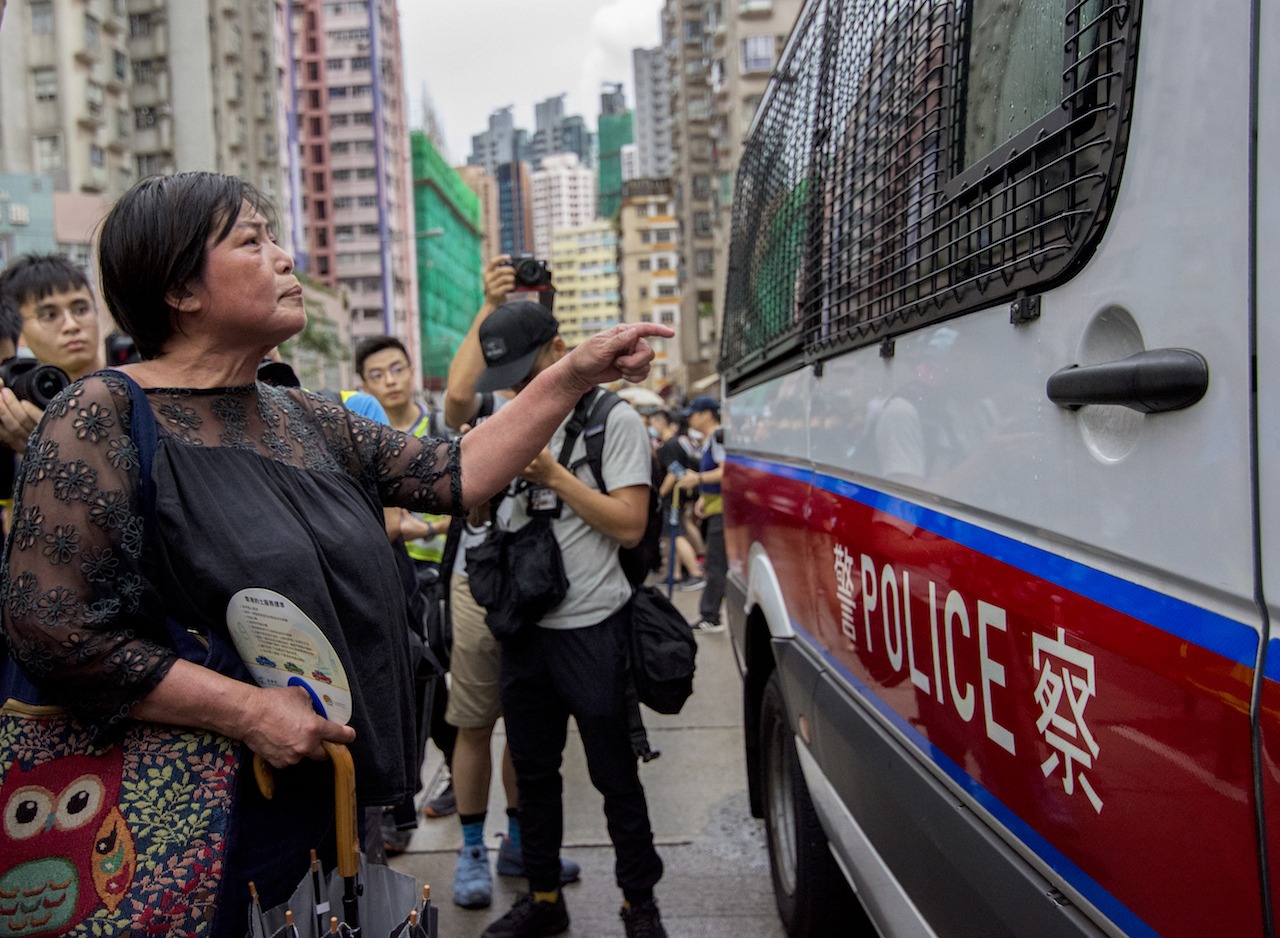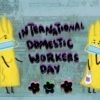Original: 【全港九新界離島師奶反送中聯署】(Google Form-circulated petition)
Translator: Promise Li
If you would like to be involved in our translation work, please get in touch here.
Translator’s note: In the days leading up to the first anti-extradition protests in June, countless self-organized petitions began circulating among social media and other platforms. One of which, started by a Kwun Tong–based housewife Wong Choi-fung, gathered signatures of Hong Kong housewives in support of the protests. Wong obtained a PhD in Gender Studies at the Chinese University of Hong Kong, and worked as a part-time instructor before quitting to become a full-time housewife to take care of her disabled family members. She has also been active in LGBTQ+ rights, #MeToo, and other social movements. Powerfully relating housewives’ material conditions to the protestors’ demands for democracy, the petition was signed by over 6000 individuals by the June 9th protest.
The short but rich petition statement is written in a colloquial diction in Cantonese. By using the Cantonese slang for “housewife,” 師奶, instead of the more formal 主婦, the petition highlights the voices of those traditionally excluded from intellectual or political discourse. The 主婦 is formal and bureaucratic, legible to the state and academia; the 師奶 is a much more unruly, almost comedic, figure — associated with a complex of thick cultural markers familiar to Hong Kongers.
The petition’s demotic rhetoric brings a nuanced political perspective into focus, one that sees housewives’ labor as work while aiming toward an inclusive and transnational political framework. While not cited explicitly, Selma James, Silvia Federici, and the Wages for Housework movement’s influences run strong in this piece. In a 1972 pamphlet, Mariarosa Dalla Costa and Selma James write that “the housewife’s position in the overall struggle of women is crucial, since it undermines the very pillar supporting the capitalist organization of work.” In a separate Facebook statement in preparation for the August 5th General Strike, Wong and the housewives explicitly identify housewives’ participation in suspending work as an important part of the strike.
In this vein, Wong’s statement refuses to see female laborers as ephemeral to Hong Kong’s struggle for liberation. The petition also foregrounds accessibility as a key issue, as suggested by the repeated references to housewives’ fatigue and limited time. (“Please patiently wait for the housewives’ team to update [the signatures] in their spare time after taking care of their kids and other housework.”)
The statement ultimately emphasizes transnational solidarity between housewives, especially those facing political and economic oppression in China. This perspective offers a much-needed alternative to some of the nativist sentiment in the opposition camp. The ending call for solidarity between various marginalized and intersecting identities within the housewife population directly challenges the different kinds of exclusionary sentiments held by some of the protestors, from racism against Southeast Asian domestic workers to xenophobic violence against Mainland Chinese immigrant workers.
In the end, Wong questions how the rights and conditions of housewives are negatively impacted under “One Country, Two Systems.” Her view of housewives’ role in the struggle cannot be any more clear: when “housewives strike, tyranny will fall.” The phrase’s terse formation in Cantonese — “師奶罷工,暴政必亡” — preserves the form of a recitable maxim. But here, the subjects, like Hong Kong’s leaderless masses, are no conventional heroes or exemplars: the perfect foil to “tyranny” (暴政) is the embodied and unruly 師奶.
I note some points in the text where the translation inevitably fails to capture the full sense and implications of certain idiomatic phrases. All hyperlinks are provided by the translator, not the author, in order to give more context to an English-reading audience.
Housewives across Hong Kong, Kowloon, New Territories and the Outlying Islands Anti-Extradition Bill Joint Letter
Every day, housewives try their best to complete their work of caring for the family, but that doesn’t mean that we don’t care about our society. No matter how tired we are, as a part of society, we have the duty to come and speak out against the extradition bill.
There are only 20 days of consultation for such an important bill? In February of 2019, the Hong Kong government proposed to revise the fugitive law, allowing Hong Kong citizens to be extradited to Mainland China for trial. On the surface, the government says that this is necessary to deal with the Chan Tong-kai case. But people in Taiwan already said that this legislative reform wouldn’t work. Different legal experts and politicians have also proposed alternative ways to deal with the Chan case, but the government doesn’t listen.
The government wants to hold its citizens by the neck without a doubt. The fugitive law, passed more than twenty years ago, is not a “flaw” as the government claims. The housewives remember that the reason for passing this legislation at the time was because citizens were concerned about China’s impoverished human rights protections, rule of law, and criminal justice system. In contrast, the current amendments to the law would give the Chief Executive the sole authority to begin extradition proceedings merely by signing a personal letter. This would allow the Chief Executive to bypass the Legislative Council to personally oversee extradition processes down to the detail, thus eroding the existing system of checks and balances over the extradition process.
[The bill is] so significant and controversial, with hundreds of thousands of people marching to oppose this legislation — but we only get twenty days for a consultation? That’s even less time than my menstruation cycle! In the end, the “following the process” only meant consulting the opinions of the business world. And so the government doesn’t care about the various opposing voices and actions — ”jumping the procedure” straight to the second reading. Isn’t the government really full of shit? [An equivalent idiom: having incriminating secrets or skeletons in the closet.]
If the authoritarian regime continues to stubbornly persist in its wrongful ways, then housewives will strike, and tyranny must fall.
Afraid that Hong Kong would quickly turn into China? These amendments to the fugitive law would really affect housewives’ lives, putting us on edge every day. The baseline for prosecution in Mainland China’s system changes arbitrarily, and their judicial system is unfathomable. We know [some] housewives in the Mainland who haven’t seen their husbands for a while; they find it impossible to locate their spouses, with no way of viewing judicial records, and can’t even visit them in jails, if found. We know that some Mainland housewives can’t even publicly mourn daughters who died in earthquakes and natural disasters. We know that Mainland housewives are illegally imprisoned for protesting and speaking out. While we strongly admire and support these housewives, we want to try not to be the next in line.
[Why are we] afraid for the next generation? To be honest, how many years do we have left to live? It’s corny for us to say, but we are more worried about the next generation [than ourselves]; there’s a long road ahead for them. If the city’s living conditions grow worse and worse, they’re the ones who have the suffer the consequences. Are we worried that our younger generations would have to carry on the consequential duty of protest and dissent? Of course: for justice, we cannot but do consequential things, for we must support each other no matter which generation you are in. But not just that. This bill made me realize, no matter what younger people want to pursue for a career — starting a business, opening a bookstore, becoming a lawyer, a journalist, or an artist — they would all lose their security. Even the most good-natured and honest kind of work, like being a social worker or any blue-collared worker, would also be decimated.
[How do we] repay our older generation? Our parents, grandparents, and other elders — some have experienced various kinds of oppression in China, we have the duty to protect them, and not to walk the old paths again. Our parents, who worked hard to raise us, once taught us: “all for one; one for all.” We cannot continue to hide our conscience.
Is there no value left to “One Country, Two Systems”? Maybe this framework hasn’t been able to continue protecting the rights of all housewives. Just like the institution of marriage, it may end up reinforcing nationalism, capitalism, and patriarchy. But, at least for now, under various layers of oppression and pressure, we must hold a good conscience.
What about our participation in the protests? Maybe we might end up having to take care of our households and can’t make it to the protest on June 9. But, we are certainly against unjust amendments to the law, against the extradition bill. Housewives of all types — full-time, part-time, disabled, elderly, single, newly immigrated, of other ethnicities, of any class status that still needs to take care of the elderly, young, and disabled — we must all be in solidarity with each other and support each other whatever way we can. If the authoritarian regime continues to stubbornly persist in its wrongful ways, then housewives will strike, and tyranny must fall.
Petition Initiator: Kwun Tong housewife Wong Choi-fung (household has two disabled persons)
28 May 2019




